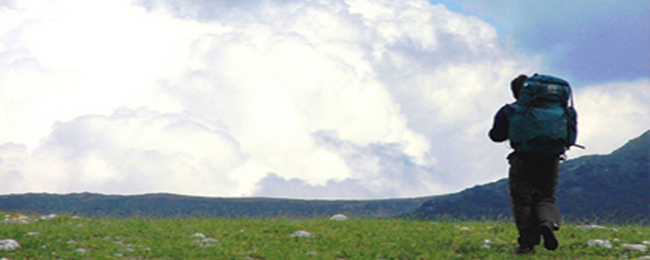How to Become a Traveling Nomad Entrepreneur in 5 Steps
Imagine visiting a new town every day, skipping from one country to another over the course of a few weeks.
Sounds like an ideal vacation… but it’s an even-better job.
More and more people are making the decision to become a location-independent, traveling entrepreneur. Below I’ll walk you through how to become a “digital nomad” in five steps.
#1 Save up Money
Before you jump out of an airplane, you strap on a parachute. Before you hop on the nomad trail, you make sure that you have some cash saved up so that you can ride out the rough patches.
“Put your head down and put away some money,” advises Matt Wilson (Under 30 CEO). He continues, “You need some savings… as a buffer if you are going to make a long-term habit of living outside of the United States.”
How much Money Should You Save?
The answer depends on (A) the cost of living per month where you’re going, (B) the cost of travel to/from this location, and (C) how much your willing to go without luxury and security. You’ll also want to consider the travel cost of renewing your visa every 30, 60, or 90 days.
Let’s say I want to begin my nomad life in Costa Rica. I’m going to need at least enough money for the flight to and from Denver (about $600). Then I’ll need about $500 for the first month of food, lodging, wifi, and bus fare. Then it’s just a matter of how much I would want for luxuries (about $100) and a “rainy day fund” (let’s say $2800).
For this example, I would save up $4000 before buying my ticket to San Jose. Depending on where you’re at in life, that may seem like a fortune or chump change.
Given the risk of your laptop breaking, you needing medical attention, or your best friend getting married back home… it’s always a good idea to save up more money than you think you’ll need.
…or Don’t
“Leap and the net will appear.”
Zen saying
Like to take risks? Thrive under pressure?
If so, you don’t have to save up much money before you start. John Bardos of Jet Set Citizen had just $1000 dollars to his name when he arrived in Japan and began his life as a nomadic entrepreneur. Bardos hit the ground running and never looked back. He says, “It was easy because I had nothing to lose.”
Not having a financial safety net will motivate you to succeed, since you won’t have any other choice. Still, I recommend you have at least enough money for one month’s rent and transportation to get home at all times.
#2 Get the Essentials
Some items are no-brainers. If you’re a photographer, obviously you’re going to need your camera. Most everyone is going to need a laptop and a padded bag for it. Of course, you won’t forget your toothbrush.
Here are some essential items and resources that you may not have thought of:
External GPRS/EDGE/3G USB Modem
These little doodads plug into a USB port and turn a cell phone data network into an Internet connection. This vastly expands the number of locations you’ll be able to work while traveling.
Theft Protection Software
For most digital nomads, their laptop is their livelihood. But the value of electronic devices also makes them attractive to thieves.
If your laptop, tablet, or smart phone is ever stolen or misplaced while traveling you’re going to wish you had a way of locating it remotely. Prey anti-theft software is just that. Registering up to three devices is free and it only takes a couple minutes.
Online Backup
Services like Mozy offer regular cloud-based backups in case anything goes awry. For one computer, it can cost as little as $5.99 per month (about $72 per year).
External Hard Drive
As a video producer, my work eats up Gigabytes like PacMan eats dots. For me, an external hard drive is the cost of doing business.
But even if you don’t need an external hard drive for the storage, you should have one for a backup. Online backups are great, but you won’t always have access to a consistent, high-speed Internet connection.
You can pick up a 1TB external hard drive for under $100.
Pocket Notebook
When you’re hiking the Himalayas, you may not have your laptop handy. Ditto for when you’re laying on the beach.
But those are both times when you’re likely to feel inspired and creative. Always have a notebook on you and you’ll always be able to catch lightning in a bottle for your business – even when it strikes in the most remote of places.
A Grasp of the Language
A few important phrases in the native language goes a long way. I’ve personally used DuoLingo to sharpen up my Spanish. It’s amazingly robust (and free!) language learning software.
Unless you’re fluent, pick up a travel-sized phrasebook. Once you’ve settled in, look around for a tutor. One-on-one lessons are highly effective and may be surprisingly inexpensive.
Eliminate the Unnecessary
I just listed some of the things you’ll need to have as a digital nomad, but the list of things that you’ll need to lose is even longer. It’s important to travel light. You’ll probably have to shed the majority of your possessions unless you’ve got some generous friends/family with a big garage.
#3 Choose a Starting Location
Here are a few of the more popular countries for digital nomads:
– Thailand
– Cambodia
– Argentina
– Columbia
– Laos
– Vietnam
– Malta
– Costa Rica
There are hundreds of different factors to consider, but ultimately there’s no “best” country for digital nomads. Whether you carefully weigh your options or picking a starting location at random, the most important thing is having the right attitude (and a wifi connection, of course).
#4 Find a Reliable Location-Independent Income
Earning money is about providing value to others. The Internet has made it possible to provide value to people who live very far away from you, all around the world. It isn’t easy to do, but it is easier than ever before – thanks in part to sites like Income Diary that are completely devoted to teaching people how to make money online.
Many nomad entrepreneurs have single-person businesses that are based on providing a service (much like freelancing). This is the quickest path to being able to finance a nomadic lifestyle. If you’re interested in this path, I’ve written a guide on how to make money with a service business and another on how to attract leads and clients online.
Here are some of the more common fields for nomad entrepreneurs to take up:
The Written Word
The market for people who can write high-quality blog posts has never been larger. You could finance a modest lifestyle in many countries by writing four articles like this one per month. Of course, this job also requires an understanding of online publishing, SEO, photo-editing, and more.
There’s also work to be found transcribing, editing, and translating text.
Digital Media Specialist
If you’re a graphic designer, web developer, or software programmer, you know that there’s not much difference between working 10 miles away from your client or 1000 miles away.
Photography and video production are also well-suited to location-independence. Plus, you’ll surely find plenty of inspiring vistas to capture on your travels.
Remote Work Agreements
Increasingly, businesses are allowing their employees to work remotely. It saves on office space and can lead to higher employee satisfaction and productivity. If you’ve already got a good job and you don’t technically need to be on-site to do it, consider asking your boss if you can work remotely.
Passive Income
Developing a passive income takes more time but also offers a greater reward at the end. Create a great website, cultivate an audience of people who trust you, and you could one day make a six-figure income by selling ad space and products.
The List Goes On…
Nomadic jobs are only limited by your imagination. Nunomad’s list of location-independent careers includes everything from the bizarre (balloon artist) to the mundane (insurance agent) and everything in between (consultant, coach, camel trainer, radiologist, property manager, virtual assistant, English teacher, dancer, and importer).
#5 Hire a Virtual Staff
What’s the fun of traveling the world if you have stare at a computer screen eight hours a day, five days a week? Most businesses require daily attention to keep running smoothly – and if you’re on safari in the Serengeti, that’s just infeasible.
The solution: a virtual staff to pick up the slack.
I’ve never hired a virtual staff member myself, so this section is reinforced by one of the world’s leading experts on outsourcing, Tyrone Shum. Back in 2005, Shum started an online Dragonboat paddle business. Business was so good that Shum was working 60 hours a week. That’s when he decided to hire a virtual staff. Within six months, Tyrone was working just 10 hours a week.
Use a Virtual Staff-Finding Service
If hiring someone who lives in a different country to be a part of your business sounds like a daunting task to take on on your own, you’re right. Tyrone Shum told us about his misguided first attempt:
“When I first started, I spent weeks on end trying to find the right person, to negotiate the best price, the best working conditions, and all that kind of stuff. But in the end, they didn’t even stay.”
from Web Domination 20
After this, Shum turned to a virtual staff-finding service and he’s never looked back. He recommends Virtual Staff Finder: “They go through the whole process and you pay a one-time fee. They come back to you with three candidates, you meet them and find out if they’ve got the right skills for you, and then – bang – you’re up and away.”
Start with a Virtual Assistant
Eventually, you may want to hire a whole staff: programmers, designers, writers, and more. But Shum says that “the first position to outsource is a virtual assistant.” Virtual assistants can do anything from handling your emails to maintaining your blog to running your social media.
They give you more time to focus on growing your business – and allow you the freedom to go on adventures without the gears of your business grinding to a halt.
How much does it Cost to Hire a Virtual Assistant?
The price is always in flux. Shum told us that when he started the going rate for a full-time virtual assistant was “roughly $300 a month” but that the price had already crept up to $450/month.
More skilled positions, like web developers, will be a bit pricier.
Note: If you’re really serious about outsourcing, I recommend you check out our interview with Tyrone Shum in Web Domination 20. He goes into detail about his hiring process, his management style, and what he’s learned to look for in a virtual staff candidate.
Ready to Become a Traveling Nomad Entrepreneur?
Then book your flight and pack your bags! If you’re still not sure what you want out of your work and life, you may want to check out our page on how to get your ideal lifestyle as an entrepreneur.
Post Image Photo Credit: Claudio Vaccaro.
"Do Not Write Another Blog Post Until You Watch This Free Video..."

Watch this free video to learn...
- How I got over 10,000,000 people to visit my websites.
- The types of blog post that got me all that traffic.
- How to get someone else to do it for you!














Yes, Vietnam is a great place to traveling…
It’s cheap and beautiful!
That’s what I’ve heard. I would love to visit some time.
Great article, Nick. As an older guy I’m always so surprised at all the young entrepreneurial types in the USA who hang out on websites like this wishing and wondering how they can get something going so they can become independent. Here’s a thought … make the move now,
You can move overseas and build your business for half of what you are paying back in the USA for “fixed carrying costs” every month … not to mention potential huge income tax savings.
My only quibble with your article is you left the Philippines off the list of starting places. I’ve been living in the Philippines 7 years now and I probably never will go back to the USA. The environment here is great for online entrepreneurs (as in no taxes at all on money made outside the Philippines), the cost of living is cheap, the on-line community is vibrant and well (ever notice how many online businesses outsource to the Philippines … there’s a reason for that), and English is an official language so you don’t have to face that much of a language barrier.
Any country is as good or as bad as you make it, but myself I find it’s easy to make it good here in the Philippines.
I totally agree, Dave. The barriers to becoming location-independent are lower than a lot of people think. My list wasn’t meant to be fully-inclusive, but you’re right that I should have included the Philippines.
My wife and I (and our two dogs) have been location independent for almost four years – traveling in an RV throughout the US and Canada. It’s not as easy as it looks … It’s not as hard as people think.
That sounds like an amazing adventure, Rod.
Awesome stuff Nick! I have visited all suggested countries save Malta, Argentina and Columbia….did hit Peru though. I am flying from the US to Bangkok tomorrow, then off to Nepal. Traveling for 2 and a half years and making money online. Love it!
Good luck on your travels. I’m glad to hear you’re loving the nomadic life. Thanks for chiming in!
What about travelling in your own country ? What could be more cheaper than a domestic train fare ?? (or even a bus one)
You’re right – traveling in your own country is a very accessible path to the traveling entrepreneur lifestyle. But if you live in a particularly expensive country, it may actually be more affordable to travel elsewhere.
This is a great post like your other great posts. I really learn from you.
Thanks!
A really great article! I dream for a few years now of becoming a digital nomad and I am planning on making the big step by the end of 2015. My approach was a bit different: I started building my online income first, getting a decent cash flow every month, and now I’m planning where to go and how to start this adventure.
You have a lot of patience to be planning so far in advance. I’m glad you enjoyed the article.
Totally agree.Sounds like a good plan
Good stuff… I’m meeting more and more people in real life that are completely location independent with their business. It’s inspiring!
Great post! I’m a travelling nomad, running my own startup. I make apps and games and I help people to start their own apps business. Two BIG things – without a doubt get a VA. This has made the BIGGEST different in my life. It was freed up much for my time. Secondly – focus on generating passive income that does not require you to be in a specific location. I found that while I had multiple ideas and projects, the hard part about this is deciding to concentrate ONLY one max 2 projects at a time that stand the best chance of success. Great blog!
Great post. This is the target I have been aiming for for three years. I enjoy working but want to do it on my terms and really deliver quality rather than just turning a crank for a “boss”. Travel is one way to collect critical experiences that will “flavor” our posts and provide quality substance for our content. You put down all the practical stuff. Now just have to assemble the base business – and off we go too!
Thanks Brad
Exact tips and strategies which I started to use when i first moved to Europe and started travelling while working with my clients as SEO and web services provider.
First I got to this after reading the become SEO expert in 48 hours at location 180, which is article I advice for anyone new to the game to go read.
Thanks for sharing such amount of useful links on this post whicl me and my team at ClickDo (UK) will be reading in this beautiful Monday morning while working on the latest eBook publications.
I am planning my next trip to Thailand. Hope it would be awesome.
Working within the states gets so pricey! While at Starbucks, Panera, and Barnes & Noble I feel compelled to buy 10.00 worth of snacks just to be a good patron. This however combats #1. I like the idea of simply taking the 1000.00 that I have and going to a foreign land to work it all out as the amount of pressure to spend decreases, the pressure to succeed increases.
Good stuff Nick.
I really need to look more into hiring a virtual staff to help me manage some of my tasks online.
I’ll have to check out some of Tyrones stuff.
Just Say “Woh”. Thank You.
Umar
Excellent Post . Thank you for Sharing..